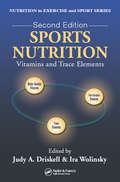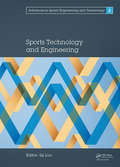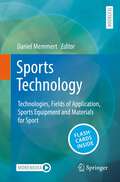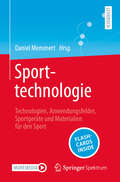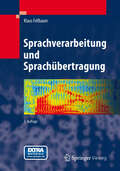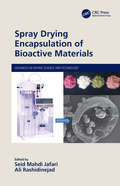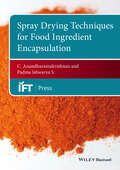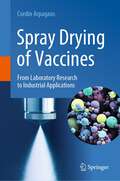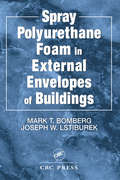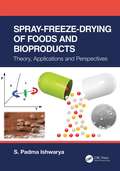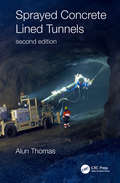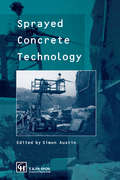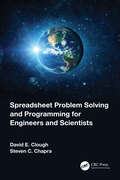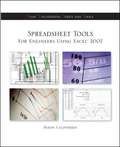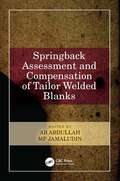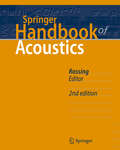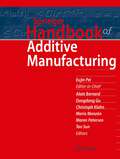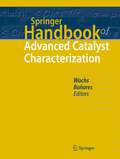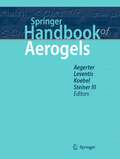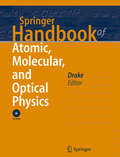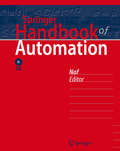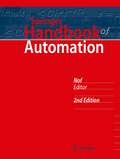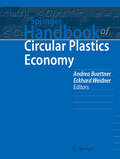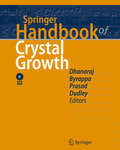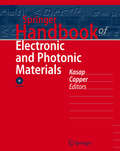- Table View
- List View
Sports Nutrition: Vitamins and Trace Elements, Second Edition
by Judy A. Driskell Ira WolinskyIn competitive sports where an extra breath or a millisecond quicker neural response can spell the difference between fame and mediocrity, a number of myths have persisted around the impact of what might be considered megadoses of various vitamins and trace elements. We do know that a growing body of research indicates that work capacity, oxygen co
Sports Technology and Engineering: Proceedings of the 2014 Asia-Pacific Congress on Sports Technology and Engineering (STE 2014), December 8-9, 2014, Singapore (Advances in Sports Engineering and Technology)
by Qi LuoThe 2014 Asia-Pacific Congress on Sports Technology and Engineering (STE 2014) was held in Singapore, December 8-9, 2014. STE2014 was a comprehensive conference focused on various aspects of advances in Sports Technology and Engineering. Topics covered by the contributions to this proceedings volume include but are not limited to Sports Science, Co
Sports Technology: Technologies, Fields of Application, Sports Equipment and Materials for Sport
by Daniel MemmertSports technological tools and innovations are gaining increasing significance in amateur, elite, and health-related sports. Sports technology refers to the application of scientific and technical principles, along with innovative technologies, to enhance athletic performance, increase safety, and consequently optimize the overall sporting experience. This involves the design, development, and utilization of equipment, devices, systems, and software specifically tailored for athletic purposes.This textbook aims to encompass the broad diversity of sports technology by featuring contributions from over 30 authors within their respective specialized fields, summarizing the latest insights concisely. The work is structured into five main sections: Data Acquisition Systems, Sports Equipment and Materials, Diagnostics, Evaluation and Communication, and Selected Fields of Application. Students with a connection to sports science gain a comprehensive understanding of sports technology supported by a carefully designed concept that facilitates easy delivery of learning content. Digital learning cards (SN Flashcards) reinforce the learning effect and ensure optimal exam preparation. For advanced learners, in-depth discussions on topics such as tracking data, digital training assistants, sports floor characteristics, virtual reality in sports, smartphone apps, and diagnostic tools offer additional value.
Sporttechnologie: Technologien, Anwendungsfelder, Sportgeräte und Materialien für den Sport
by Daniel MemmertSporttechnologische Tools und Innovationen erhalten im Breiten-, Leistungs- und Gesundheitssport eine immer größere Bedeutung. Sporttechnologie bezieht sich auf die Anwendung wissenschaftlicher und technischer Prinzipien sowie innovativer Technologien, um sportliche Leistung zu verbessern, die Sicherheit zu erhöhen und somit das gesamte Sporterlebnis zu optimieren. Dabei geht es um das Design, die Entwicklung sowie den Einsatz von Ausrüstung, Geräten, Systemen und Software, speziell für sportliche Zwecke.Dieses Lehrbuch möchte der breiten Vielfalt der Sporttechnologie gerecht werden, indem mehr als 30 Autorinnen und Autoren aus ihrem Spezialgebiet berichten und neuste Erkenntnisse prägnant zusammenfassen. Das Werk gliedert sich in fünf Hauptabschnitte: Daten-Erfassungssysteme, Sportgeräte und Materialien, Diagnostik, Evaluation und Kommunikation sowie Ausgewählte Anwendungsfelder. Studierende mit Bezug zur Sportwissenschaft erhalten einen umfassenden Einblick in die Sporttechnologie, unterstützt durch ein didaktisch ausgefeiltes Konzept, das eine einfache Vermittlung der Lerninhalte ermöglicht. Digitale Lernkarten (SN Flashcards) untermauern den Lerneffekt und gewährleisten eine optimale Prüfungsvorbereitung. Für Fortgeschrittene bietet die vertiefende Diskussion von Themen wie Tracking Daten, digitalen Trainingsassistenten, Sportbodeneigenschaften, virtuelle Realität im Sport, Smartphone Apps und Diagnostik-Tools einen zusätzlichen Mehrwert.
Sprachverarbeitung und Sprachübertragung
by Klaus FellbaumIn dem Standardwerk der Informationsverarbeitung werden nicht nur die elektroakustischen und nachrichtentechnischen Grundlagen dargestellt, auch die Sprache als menschliche Kommunikationsform wird aus linguistischer und physiologischer Perspektive beschrieben. Berücksichtigt wird dabei neben der Theorie stets die Anwendung - auf dem neuesten Stand der Technik. Die 2. Auflage bietet neue Abschnitte zu den Grundzügen der Signalanalyse und zu Sprachdialogsystemen. Audiobeispiele und multimediale Vortragselemente zum Download auf extras.springer.com.
Spray Drying Encapsulation of Bioactive Materials (Advances in Drying Science and Technology)
by Seid Mahdi Jafari Ali RashidinejadEncapsulation of bioactives is a fast-growing approach in the food and pharmaceutical industry. Spray Drying Encapsulation of Bioactive Materials serves as a source of information to offer specialized and in-depth knowledge on the most well-known and used encapsulation technology (i.e., spray drying) and corresponding advances. It describes the efficacy of spray drying in terms of its advantages and challenges for encapsulation of bioactive ingredients. Discusses the potential of this technique to pave the way toward cost-effective, industrially relevant, reproducible, and scalable processes that are critical to the development of delivery systems for bioactive incorporation into innovative functional food products and pharmaceuticals Presents the latest research outcomes related to spray drying technology and the encapsulation of various bioactive materials Covers advances in spray drying technology that may result in a more efficient encapsulation of bioactive ingredients Includes computational fluid dynamics, advanced drying processes, as well as the morphology of the dried particles, drying kinetics analyzers, process controllers and adaptive feedback systems, inline powder analysis technologies, and cleaning-in-place equipment Aimed at food manufacturers, pharmacists, and chemical engineers, this work is of interest to anyone engaged in encapsulation of bioactive ingredients for both nutraceutical and pharmaceutical applications.
Spray Drying Techniques for Food Ingredient Encapsulation
by Padma Ishwarya S. C. AnandharamakrishnanSpray drying is a well-established method for transforming liquid materials into dry powder form. Widely used in the food and pharmaceutical industries, this technology produces high quality powders with low moisture content, resulting in a wide range of shelf stable food and other biologically significant products. Encapsulation technology for bioactive compounds has gained momentum in the last few decades and a series of valuable food compounds, namely flavours, carotenoids and microbial cells have been successfully encapsulated using spray drying. Spray Drying Technique for Food Ingredient Encapsulation provides an insight into the engineering aspects of the spray drying process in relation to the encapsulation of food ingredients, choice of wall materials, and an overview of the various food ingredients encapsulated using spray drying. The book also throws light upon the recent advancements in the field of encapsulation by spray drying, i.e., nanospray dryers for production of nanocapsules and computational fluid dynamics (CFD) modeling. Addressing the basics of the technology and its applications, the book will be a reference for scientists, engineers and product developers in the industry.
Spray Drying of Vaccines: From Laboratory Research to Industrial Applications
by Cordin ArpagausThis book addresses the stabilization of vaccine powders by spray drying and provides an overview of the current state of the art on a laboratory and industrial scale. The book aims to familiarize readers with the advances in vaccine spray drying technology to understand its application potential better. In particular, the book addresses the design of aseptic spray dryers, parameters affecting the spray drying process, sterile powder processing, cleaning procedures, and powder filling. In addition, different drying technologies for the production of dry powder vaccines are compared to discuss the unique capabilities of spray drying as a particle technology for vaccines. Special attention is given to research studies on spray-dried vaccines published over the past 30 years, with key findings from laboratory research to clinical trials. Potential applications of spray-dried vaccines and routes of administration are presented in detail. Finally, an outlook is given on how close the aseptic spray-drying of vaccines is to the market and the challenges that need to be overcome to be commercially successful. The book's target audience is academics, researchers, vaccine developers, industry experts, students, and possibly funders, including government agencies, who are active in the field. In addition, the book is a reference source for those involved in the vaccine formulation and biopharmaceutical processing industry.
Spray Polyurethane Foam in External Envelopes of Buildings
by Mark T. Bomberg Joseph W. LstiburekSpray Polyurethane Foams in External Envelopes of Buildings presents, for the first time, a book focused on both the theoretical and practical design and applications of spray polyurethane foam (SPF) use. To review the moisture performance of SPF, this book focuses on the design of an assembly where moisture is kept from accumulating and causing deterioration (flow through approach). In this approach, Spray Polyurethane Foam presents two unique parts of theory and practice of various SPF products. FROM THE PREFACEPart 1 of this monograph analyzes SPF performance as the material (product). Being field fabricated, installation of SPF products must include a quality assurance program . . . Laboratory evaluation of foams and their coverings, quality management issues, and quantification of the technical support provided to the SPF contractor are also reviewed. Part 2 presents a systems approach to construction. Starting with principles of environmental control of buildings, different aspects of design and performance of roofing and wall systems are reviewed. Details and design recommendations . . . as well as case studies . . . are included.
Spray-Freeze-Drying of Foods and Bioproducts: Theory, Applications and Perspectives
by S. Padma IshwaryaSpray-freeze-drying (SFD) is a synergistic drying technology that imbibes in it the merits of both spray drying and freeze-drying, whilst overcoming the limitations of these predecessor technologies. SFD produces uniquely powdered food and pharmaceutical products with porous microstructure and superior quality attributes. Owing to its atomization step and ultra-low-temperature operation, SFD is a competent drying technique for the production of valuable but sensitive bioactive components. Despite the costs and complexities involved, SFD has a competitive edge over the conventional drying techniques in providing distinctive product attributes. The applications of spray-freeze-drying in the area of food and bioproducts span across the product categories of instant food powders, dry flavors, active pharmaceutical ingredients, poorly water-soluble drugs, probiotics, proteins, enzymes and vaccines. Spray-Freeze-Drying of Foods and Bioproducts: Theory, Applications and Perspectives is the first exclusive title on this interesting drying technique. It provides a comprehensive understanding of the fundamentals of SFD and its food and pharmaceutical applications. The scope of this book, comprising 12 chapters, has been organizedunder four major headings: fundamentals of process-stages, applications with case-studies, recent advancements and the processing bottlenecks and solutions. Key Features Provides examples and case studies of nuances and intricacies associated with each stage of the spray-freeze-drying process Highlights the applications of spray-freeze-drying in the production of food products including soluble coffee, dairy powders, probiotics and flavors Serves as a ready-reckoner of characterization methods for spray-freeze-dried products Contains 200+ illustrations and tabulations The contents of this book are organized to cater to the knowledge needs of students, academicians, researchers and professionals in the food and pharmaceutical industry.
Sprayed Concrete Lined Tunnels
by Alun ThomasSprayed concrete lined (SCL) tunnels are growing rapidly in popularity due to their versatility. The design and construction of both hard rock and soft ground tunnels has been revolutionised by the advent of the SCL method and now the use of permanent sprayed concrete linings has unlocked the true potential of the method to minimise construction costs and times. Yet the complex early age behaviour of the sprayed concrete makes the design difficult and requires a robust management system during construction. Consequently the great advantages of the method must be balanced against the risks, as a few high-profile tunnel collapses have illustrated. <p><P>Practising engineers on site, in the design office or in client organizations will find this book an excellent introduction. It covers all aspects of SCL tunnelling – from the constituents of sprayed concrete to detailed design and management during construction. Although there is a close interdependence between all the facets of sprayed concrete, few engineers have the right breadth of experience and expertise to cover all of them. This urgently needs to be transferred to the wider engineering community as SCL tunnels play an increasingly important role in the delivery of the underground infrastructure which modern urban life demands. <P><P>In this second edition, beyond a general updating to reflect new developments, the sections on permanent sprayed concrete, the innovative technology of spray applied waterproofing membranes, fibre reinforcement (both steel and macrosynthetic) and composite lining design have been expanded. Sustainability and environmental impact are addressed in a new section.
Sprayed Concrete Technology
by S. A. AustinThe process of spraying concrete is one of the most versatile concrete placing techniques, and is used in a wide range of applications - from construction of new tunnels, domes, tanks and pools, to repair and strengthening of existing structure. The steady growth in interest and application in the technique is reflected in this book, which brings t
Spreadsheet Problem Solving and Programming for Engineers and Scientists
by David E. Clough Steven C. ChapraSpreadsheet Problem Solving and Programming for Engineers and Scientists provides a comprehensive resource essential to a full understanding of modern spreadsheet skills needed for engineering and scientific computations. Beginning with the basics of spreadsheets and programming, this book builds on the authors’ decades of experience teaching spreadsheets and programming to both university students and professional engineers and scientists. Following on from this, it covers engineering economics, key numerical methods, and applied statistics. Finally, this book details the Visual Basic for Applications (VBA) programming system that accompanies Excel. With each chapter including examples and a set of exercises, this book is an ideal companion for all engineering courses and also for self-study. Based on the latest version of Excel (Microsoft Excel for Microsoft 365), it is also compatible with earlier versions of Excel dating back to Version 2013. Including numerous case studies, this book will be of interest to students and professionals working in all areas of engineering and science.
Spreadsheet Tools for Engineers Using Excel 2007
by Byron S. GottfriedThis practical text is a perfect fit for introductory engineering courses by successfully combining an introduction to Excel fundamentals with a clear presentation on how Excel can be used to solve common engineering problems. Updated to ensure compatibility with Excel 2007,Spreadsheet Tools for Engineers Using Excel 2007provides beginning engineering students with a strong foundation in problem solving using Excel as the modern day equivalent of the slide rule. As part of McGraw-Hill's BEST series for freshman engineering curricula, this text is particularly geared toward introductory students. The author provides plenty of background information on technical terms, and provides numerous examples illustrating both traditional and spreadsheet solutions for a variety of engineering problems. The first three chapters introduce the basics of problem solving and Excel fundamentals. Beyond that, the chapters are largely independent of one another. Topics covered include graphing data, unit conversions, data analysis, interpolation and curve fitting, solving equations, evaluating integrals, creating macros, and comparing economic alternatives.
Springback Assessment and Compensation of Tailor Welded Blanks
by Ab Abdullah Mf JamaludinFocusing on techniques developed to evaluate the forming behaviour of tailor welded blanks (TWBs) in sheet metal manufacturing, this edited collection details compensation methods suited to mitigating the effects of springback. Making use of case studies and in-depth accounts of industry experience, this book gives a comprehensive overview of springback and provides essential solutions necessary to modern-day automotive engineers. Sheet metal forming is a major process within the automotive industry, with advancement of the technology including utilization of non-uniform sheet metal in order to produce light or strengthened body structures. This is critical in the reduction of vehicle weight in order to match increased consumer demand for better driving performance and improved fuel efficiency. Additionally, increasingly stringent international regulations regarding exhaust emissions require manufacturers to seek to lighten vehicles as much as possible. To aid engineers in optimizing lightweight designs, this comprehensive book covers topics by a variety of industry experts, including compensation by annealing, low-power welding, punch profile radius and tool-integrated springback measuring systems. It ends by looking at the future trends within the industry and the potential for further innovation within the field. This work will benefit car manufacturers and stamping plants that face springback issues within their production, particularly in the implementation of TWB production into existing facilities. It will also be of interest to students and researchers in automotive and aerospace engineering.
Springer Handbook of Acoustics
by Thomas D. RossingThis is an unparalleled modern handbook reflecting the richly interdisciplinary nature of acoustics edited by an acknowledged master in the field. The handbook reviews the most important areas of the subject, with emphasis on current research. The authors of the various chapters are all experts in their fields. Each chapter is richly illustrated with figures and tables. The latest research and applications are incorporated throughout, including computer recognition and synthesis of speech, physiological acoustics, diagnostic imaging and therapeutic applications and acoustical oceanography. An accompanying CD-ROM contains audio and video files.
Springer Handbook of Additive Manufacturing (Springer Handbooks)
by Tao Sun Alain Bernard Dongdong Gu Christoph Klahn Eujin Pei Mario Monzón Maren PetersenThis Handbook is the ultimate definitive guide that covers key fundamentals and advanced applications for Additive Manufacturing. The Handbook has been structured into seven sections, comprising of a thorough Introduction to Additive Manufacturing; Design and Data; Processes; Materials; Post-processing, Testing and Inspection; Education and Training; and Applications and Case Study Examples. The general principles and functional relationships are described in each chapter and supplemented with industry use cases. The aim of this book is to help designers, engineers and manufacturers understand the state-of-the-art developments in the field of Additive Manufacturing. Although this book is primarily aimed at students and educators, it will appeal to researchers and industrial professionals working with technology users, machine or component manufacturers to help them make better decisions in the implementation of Additive Manufacturing and its applications.
Springer Handbook of Advanced Catalyst Characterization (Springer Handbooks)
by Miguel A. Bañares Israel E. WachsCo-edited by world-renowned scientists in the field of catalysis, this book contains the cutting-edge in situ and operando spectroscopy characterization techniques operating under reaction conditions to determine a materials’ bulk, surface, and solution complex and their applications in the field of catalysis with emphasis on solid catalysts in powder form since such catalyst are relevant for industrial applications. The handbook covers from widely-used to cutting-edge techniques. The handbook is written for a broad audience of students and professionals who want to pursue the full capabilities available by the current state-of-the-art in characterization to fully understand how their catalysts really operate and guide the rational design of advanced catalysts. Individuals involved in catalysis research will be interested in this handbook because it contains a catalogue of cutting-edge methods employed in characterization of catalysts. These techniques find wide use in applications such as petroleum refining, chemical manufacture, natural gas conversion, pollution control, transportation, power generation, pharmaceuticals and food processing. fdsfds
Springer Handbook of Aerogels (Springer Handbooks)
by Nicholas Leventis Michel A. Aegerter Matthias Koebel Stephen A. SteinerThis indispensable handbook provides comprehensive coverage of the current state-of-the-art in inorganic, organic, and composite aerogels – from synthesis and characterization to cutting-edge applications and their potential market impact. Built upon Springer’s successful Aerogels Handbook published in 2011, this handbook features extensive revisions and timely updates, reflecting the changes in this fast-growing field. Aerogels are the lightest solids known to man. Up to 1000 times lighter than glass and with a density only four times that of air, they possess extraordinarily high thermal, electrical, and acoustic insulation properties, and boast numerous entries in Guinness World Records. Originally based on silica, R&D efforts have extended this class of materials to incorporate non-silicate inorganic oxides, natural and synthetic organic polymers, carbon, metal, and ceramic materials. Composite systems involving polymer-crosslinked aerogels and interpenetrating hybrid networks have been developed and exhibit remarkable mechanical strength and flexibility. Even more exotic aerogels based on clays, chalcogenides, phosphides, quantum dots, and biopolymers such as chitosan are opening new applications for the construction, transportation, energy, defense and healthcare industries. Applications in electronics, chemistry, mechanics, engineering, energy production and storage, sensors, medicine, nanotechnology, military and aerospace, oil and gas recovery, thermal insulation, and household uses are being developed.Readers of this fully updated and expanded edition will find an exhaustive source for all aerogel materials known today, their fabrication, upscaling aspects, physical and chemical properties, and the most recent advances towards applications and commercial use. This key reference is essential reading for a combined audience of graduate students, academic researchers, and industry professionals.
Springer Handbook of Atomic, Molecular, and Optical Physics
by Gordon W. DrakeComprises a comprehensive reference source that unifies the entire fields of atomic molecular and optical (AMO) physics, assembling the principal ideas, techniques and results of the field. 92 chapters written by about 120 authors present the principal ideas, techniques and results of the field, together with a guide to the primary research literature (carefully edited to ensure a uniform coverage and style, with extensive cross-references). Along with a summary of key ideas, techniques, and results, many chapters offer diagrams of apparatus, graphs, and tables of data. From atomic spectroscopy to applications in comets, one finds contributions from over 100 authors, all leaders in their respective disciplines. Substantially updated and expanded since the original 1996 edition, it now contains several entirely new chapters covering current areas of great research interest that barely existed in 1996, such as Bose-Einstein condensation, quantum information, and cosmological variations of the fundamental constants. A fully-searchable CD- ROM version of the contents accompanies the handbook.
Springer Handbook of Automation
by Shimon Y. NofThis handbook incorporates new developments in automation. It also presents a widespread and well-structured conglomeration of new emerging application areas, such as medical systems and health, transportation, security and maintenance, service, construction and retail as well as production or logistics. The handbook is not only an ideal resource for automation experts but also for people new to this expanding field.
Springer Handbook of Automation (Springer Handbooks)
by Shimon Y. NofThis handbook incorporates new developments in automation. It also presents a widespread and well-structured conglomeration of new emerging application areas, such as medical systems and health, transportation, security and maintenance, service, construction and retail as well as production or logistics. The handbook is not only an ideal resource for automation experts but also for people new to this expanding field.
Springer Handbook of Circular Plastics Economy (Springer Handbooks)
by Andrea Buettner Eckhard WeidnerThis Springer Handbook assembles the existing knowledge concerning plastic materials and identifies obstacles and objectives of innovations and technologies that will bring human society closer to the goal of a fully circular economy of plastic materials. Consumers profit everyday from the versatile functionalities of plastic materials, but this diversity also brings a range of challenges: recycling may be costly and laborious, and too many plastic products still end up as waste in the environment. The handbook offers a source of information, a knowledge base, and inspiration for those aiming to create an economy that paves the road for future generations. The editorial board and invited authors represent international key figures from a broad range of disciplines, including chemistry, engineering, material sciences, logistics, data and information sciences, systems engineering, economy and sustainability as well as disciplines related to culture, art, and design. With its diversity, the book aims to fulfil the huge demand for information on novel technologies and legal approaches in politics, industry and society. Key topics include: Development of biodegradable plastics Advanced recycling strategies Design for recyclability Legal and economic perspectives Role of startups and innovative technologies Novel business models and business strategies By allowing the reader to learn and apply the measures needed for the implementation of a Circular Plastics Economy, the hanbook will be of particular interest to innovators, decision-makers, planners, designers, producers in industry, politics, and society as well as consumers, students, teachers, communicators, journalists, and cultural workers.
Springer Handbook of Crystal Growth
by Vishwanath Prasad Michael Dudley Govindhan Dhanaraj Kullaiah ByrappaThe Springer Handbook of Crystal Growth brings together the science and technology of growing crystals, defect characterization and techniques, and understanding the defect formation including defects modelling. This unique effort will provide users with fundamental understanding of crystal growth and defects with the latest instrumentation/ techniques available both for crystal fabrication and defects. Understanding in this rapidly advancing field deals with three main areas: Crystal growth and defect formation, growth methods, and various techniques used in characterization.
Springer Handbook of Electronic and Photonic Materials
by Peter Capper C. Koughia Safa KasapContributions from well known and respected researchers throughout the world Thorough coverage of electronic and opto-electronic materials that today's electrical engineers, material scientists and physicists need Interdisciplinary approach encompasses research in disciplines such as materials science, electrical engineering, chemical engineering, mechanical engineering, physics and chemistry
